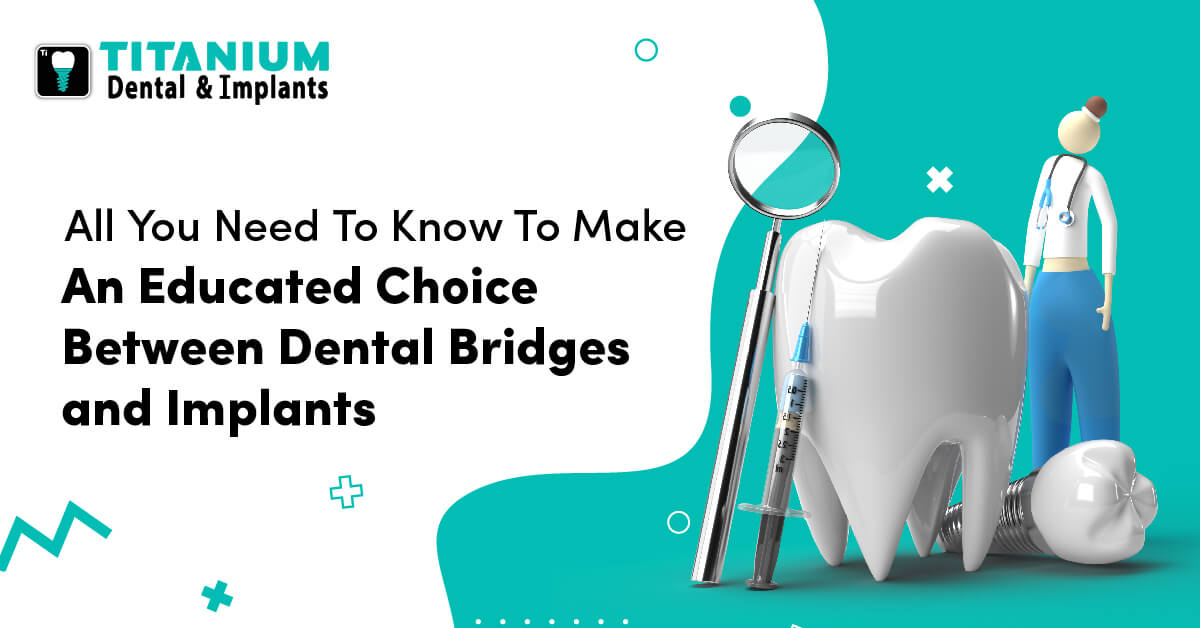Dental bridges and implants are two of the most often used methods for replacing missing teeth. Both have advantages and disadvantages despite the fact that they are both potentially useful.
In this article, we’ll examine dental bridges and implants in more detail, weigh their advantages and disadvantages, and talk about which one might be the best for you.
Bridges vs. Dental Implants: Which Is Better?
So let’s see which one is better but before we go ahead remember that your decision will ultimately depend on your health, individual dental needs, preferences, and financial situation.
Both dental implants and bridges are widely used to replacing missing teeth, however for a variety of reasons, dental implants are frequently seen as being preferable to bridges.
Reasons Include:
- Compared to bridges, dental implants are a more durable alternative.
- Dental implants stop bone deterioration.
- Adjacent teeth do not need to be altered or prepared for dental implants.
- Compared to bridges, dental implants have a more realistic appearance and feel.
Generally, most dental professionals believe that dental implants are a superior alternative to bridges, which makes them a popular choice.
But before deciding which course of action to take, you should speak with a skilled dental expert who can evaluate your unique needs and suggest the most effective course of action.
Generally, most dental professionals believe that dental implants are a superior alternative to bridges, which makes them a popular choice.
Dental Bridges
A treatment that can replace one or more lost teeth is a dental bridge. Pontics, the prosthetic teeth used in bridges, are held in place by dental crowns on neighboring teeth.
Placing a Dental Bridges
A dental bridge is typically placed over the course of two or more appointments with the dentist. The surrounding teeth are prepared for dental crowns at the initial appointment, which will hold the bridge in place. After that, impressions are made, which are later utilized to build the bridge at a dental lab. The bridge is glued into place at the second appointment.
Advantages of Dental Bridges
- Comparatively less expensive than implants.
- Simple and quick process.
- No surgery is necessary.
Drawbacks of Dental Bridges
- Last only 5 to 10 years.
- Can harm neighboring teeth by causing decay and wear.
- Cannot stop jawbone deterioration.
Dental Implants
In order to sustain a dental restoration, dental implants are prosthetic tooth roots that are inserted into the jawbone. Implants are thought to be a more long-lasting option and can be used to replace one or more lost teeth.
Process of placing a dental implant
A dental implant is inserted into the jawbone surgically as part of the placement process. A dental crown is placed on top of the implant after the healing process, which often takes many months.
Dental implants: Benefits
- Can be maintained properly for a lifetime.
- Protects against jaw bone loss.
- Does not impact nearby teeth.
Dental implants drawbacks
- Greater in cost than bridges.
- Requires surgery.
- Longer recovery period.
Dental bridge vs. implant.
Cost: Dental bridges are typically less expensive than dental implants.
Procedure: Compared to dental implants, which need surgery, dental bridges require less invasive treatments.
Duration: Dental bridges have a lifespan of about 5 to 10 years, while dental implants are typically thought to be a more durable option.
Health of adjacent teeth: Dental bridges can lead to tooth deterioration in nearby teeth, however dental implants do not rely on nearby teeth for support.
Bone Health: Dental bridges do not prevent bone loss, however dental implants do.
Conclusion
In conclusion, dental bridges and implants each have specific advantages and disadvantages. The final choice of which course of action to take should be made in collaboration with a dental expert who can evaluate your unique needs and suggest the most effective course of action.
It’s critical to seek treatment if you have one or more missing teeth in order to improve your smile and guard against subsequent oral health issues.
Go to a specialist at Titanium Dental and Implant Dentist in Fort Worth right away to find out more about your options for restoring your smile. Don’t let missing teeth keep you from living the life you want.


